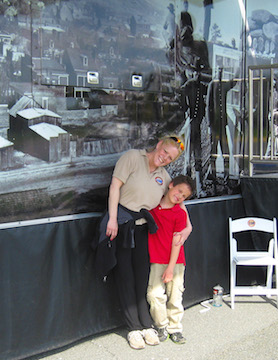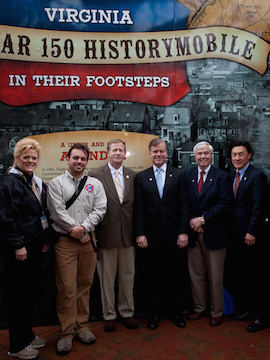A Conversation with CVBT’s Elizabeth Heffernan (part two)

(part two of three)
We’re talking this week with Elizabeth Heffernan, the new executive director of the Central Virginia Battlefields Trust (CVBT). Yesterday, Elizabeth shared an overview of the organization. Today, she talks a bit about the road that brought her to CVBT.
Chris Mackowski: When you thought about applying for the CVBT job, what was it about the organization you found attractive?
Elizabeth Heffernan: Well of course the subject matter and the mission were appealing. Naturally, it is more rewarding to be able to contribute in a positive way like this. But I was also drawn in by the diversified responsibilities of the role. Some portions of this job are things that I have successfully accomplished in past positions, which is very comforting, and then there are some things that I have never done before in my life, which I think presents a really exciting challenge.
CM: What are some of those “diversified responsibilities”?
EH: The ones that I am very familiar with are sales, marketing, finance—budgeting, purchasing, AR & AP—event coordination, and management. The responsibilities that are complete firsts for me are land acquisition, grant writing, and non-profit fund raising, which has a culture completely of its own.
CM: I’m sure each day is different because you probably have to wear a lot of hats, but what’s a typical day in the office been like for you?
EH: Picture watching the ball inside a pinball machine, I think that’s probably a lot like watching me on a typical day in the office. Ok, I am not going to be THAT person who thinks they are busier than everyone else—but dang, Chris, I do feel like I could work 24/7 at this job if my body would permit. I’m actually writing this on a Saturday in between running my personal business on the side. But you know, I wouldn’t change it for anything. What do they say? You can sleep when you’re dead!
CM: Prior to working with CVBT, you worked in events management. Tell me about that.
EH: I was the membership & activities director for nine years at the Fredericksburg Country Club, which was primarily a sales position, but I was also responsible for the planning and execution of the member events each year. Some of these parties were incredibly elaborate, boasting mass amounts of decorations that could take a year to plan and purchase, three days to set up, and all-hands-on deck staffing—and just for a six-hour event. But I really loved doing it, and the events always helped me to sell memberships, so win-win.
My most recent role, before CVBT, was project manager for the Governor’s Transportation Conference, where I developed and produced an annual three-day event that hosted 1,200 people, 30+ sponsors, and 100+ exhibitors. I increased the event funding by over 500% in just three years. I liked that it was a very challenging role with lots of moving part.
CM: You also spent some time during the Sesquicentennial working with Virginia’s History Mobile. What was that like?
 EH: For those who don’t know what the HistoryMobile is, the Virginia Sesquicentennial of the American Civil War Commission was created in 2006 by the General Assembly for the purpose of developing and implementing a program to commemorate the 150th anniversary of the Civil War in Virginia. The Civil War HistoryMobile, which was part of that program, was an interactive Civil War museum housed in a 78’ tractor-trailer that traveled primarily throughout Virginia. I was hired as the HistoryMobile logistics manager. I also managed the DMV staff that toured with the museum.
EH: For those who don’t know what the HistoryMobile is, the Virginia Sesquicentennial of the American Civil War Commission was created in 2006 by the General Assembly for the purpose of developing and implementing a program to commemorate the 150th anniversary of the Civil War in Virginia. The Civil War HistoryMobile, which was part of that program, was an interactive Civil War museum housed in a 78’ tractor-trailer that traveled primarily throughout Virginia. I was hired as the HistoryMobile logistics manager. I also managed the DMV staff that toured with the museum.
I was mostly involved with the program’s development of operations and museum staffing. Once the program launched, I coordinated the tour schedule with the hosting locations, working closely with large tourism events, localities, and schools. I toured with the group occasionally to ensure overall operations were functioning as intended.
I really enjoyed going to schools to see the excitement it generated. Some kids might not have even fully understood the presentation, but it was still very cool to be part of what, in some cases, was the first time they were ever exposed to such an important part of their history as Americans. I also enjoyed working with the HistoryMobile staff. They were an impressive group of people that worked very cohesively together, like pieces of a puzzle, because they each brought something unique to the project.
CM: What caught your interest about Civil War history as you spent all that time attending Civil War events?
EH: Where I grew up in Michigan, the Civil War was just a chapter in a fifth grade history book, so I really didn’t start to appreciate its significance until I moved to Virginia. I have found that by living in the Fredericksburg area, you don’t even need to be a history buff to get the Civil War “vibe” and start “feeling” the history—you know what I am referring to right? Once I started working on the HistoryMobile project I found that native Virginians would frequently approach me to tell the stories of their relatives who fought in the war. I then saw just how truly personal it can be and how being in such proximity to where it all happened makes it come “alive” and seem like it happened only yesterday.
I often think of those very young boys who fought back then—the youngest soldier was only 11—and it hurts just to imagine my own 13-year-old son having to face such a fierce insurmountable challenge with little hope of surviving. My heart breaks thinking of those mothers who lost their children—in some cases even more than one—to a war with our own countrymen. Then it breaks my heart even more to think about how there are Americans today who don’t even know why that sacrifice made by those CW soldiers has afforded them the freedoms that they take so for granted.
CM: Was there a favorite HistoryMobile experience you can remember or a favorite place you visited?
 EH: I would have to say that the Arlington National Cemetery was the most memorable. The somber and respectful tone was very different than the many other sites we visited, such as schools and fairs, etc. It vividly represented the purpose of our mission and reminded me of how important it is to commemorate fallen soldiers. Sometimes I just can’t even wrap my head around the thought of doing what they had to do—not only risking their own lives but having to take others to survive.
EH: I would have to say that the Arlington National Cemetery was the most memorable. The somber and respectful tone was very different than the many other sites we visited, such as schools and fairs, etc. It vividly represented the purpose of our mission and reminded me of how important it is to commemorate fallen soldiers. Sometimes I just can’t even wrap my head around the thought of doing what they had to do—not only risking their own lives but having to take others to survive.
My stepson has been a Marine now for about three years, and I just admire the guts it must take for him to get up each day and go to work, and I think how lucky Americans are that there are so many young men and women willing to risk their lives for ours.
Thank you, Ryan Heffernan! (I hope it’s ok to give him a shout out—he deserves it)
CM: Sure thing!
————
Education was obviously a key function for the HistoryMobile. Tomorrow, Elizabeth will talk about how that ties into her work with CVBT. “We are obligated to educate our children about their history,” she says.